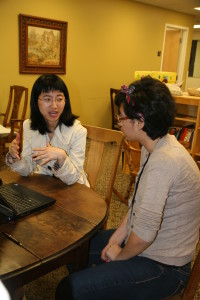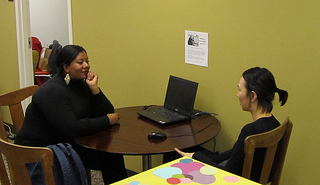Last week, I had a conversation with a fellow UCWbLer and the UCWbL director about working with multilingual writers. We discussed the different approaches to tutoring and how these might work differently with writers at different stages of language learning.
Obviously different approaches work better for some writers than they do for others, but when a writer is also in the process of learning an additional language, does their position, stage, identity, etc. in that language learning process warrant a different approach? In other words, do the same approaches work well for all levels of language learning? Or do some approaches respond better to the need of the language learner?
So we thought about it. And we talked about it. Here are two of the UCWbL’s core practices that we felt are especially important when approaching second language writers and allow tutors to effectively approach the writing.
 1) Build and Cultivate Rapport: One of the practices we stress at the UCWbL is starting appointments with conversation. Building rapport if you will. The idea is that by first just talking with the writer, we can help create that comfortable environment and help the writer to be invested in their work. As How to UCWbL, our awesome tutor handbook says, “Building and cultivating rapport engages and encourages writers.”
1) Build and Cultivate Rapport: One of the practices we stress at the UCWbL is starting appointments with conversation. Building rapport if you will. The idea is that by first just talking with the writer, we can help create that comfortable environment and help the writer to be invested in their work. As How to UCWbL, our awesome tutor handbook says, “Building and cultivating rapport engages and encourages writers.”
2) Collaboratively Set an Agenda to Guide Your Work: A conversation is also a great way to approach working with the writing itself. That may seem odd at first—how can we talk about the writing before actually looking at it? Going back to How to UCWbL, starting with a conversation—building that rapport—also “opens a dialogue about writing.” In other words, we can get a better understanding of who they are and what they really want to get out of the appointment (also what their needs may be). A simple question, so what are you trying to say or do with this, can tell us a lot about the writer and the writing. Once that dialogue is opened, we can look to the writing collaboratively and, through conversation, work together to set an agenda.
Both of these core practices are especially important for working with English language learners (ELLs) and their writing. Having that conversation—about their day, about their class, about the assignment (notice the progression)—can tell us a lot about their command of the language, their comfort with the language, and what their language needs are in terms of their writing. What’s more it can help to break down any apprehensions the ELL may have.
Having that conversation about the assignment and what the writer is trying to say/do, will give us a more informed approach to our work (i.e. what the writer’s needs really are). If an ELL brings in a paragraph of text, saying they want to work on grammar, we all know that marking up the text and correcting each grammar issue won’t be helpful. But we may not know what to focus on ( is it actually communicating what the writer wants, what grammar points should we talk about, what are their needs?) Having this conversation can point us to an answer; it gets the writer talking about their writing. And most important, it will help the writer to maintain agency.
So as you begin your next writing-based appointment with an ELL, think back to those core practices, and start a conversation.
– Mark Lazio
Discover more from UCWbLing
Subscribe to get the latest posts sent to your email.


One reply on “Second Language Writing & UCWbL Core Practices”
I think this is a really interesting and relevant post, Mark! I think it’s often easy for tutors to treat all writers the same – which could be a good thing or a bad thing, depending on your point of view – but I think pointing out the fact that ELL writers often need different help, or more thoughtful/specific strategies, to best suit their language needs is helpful.